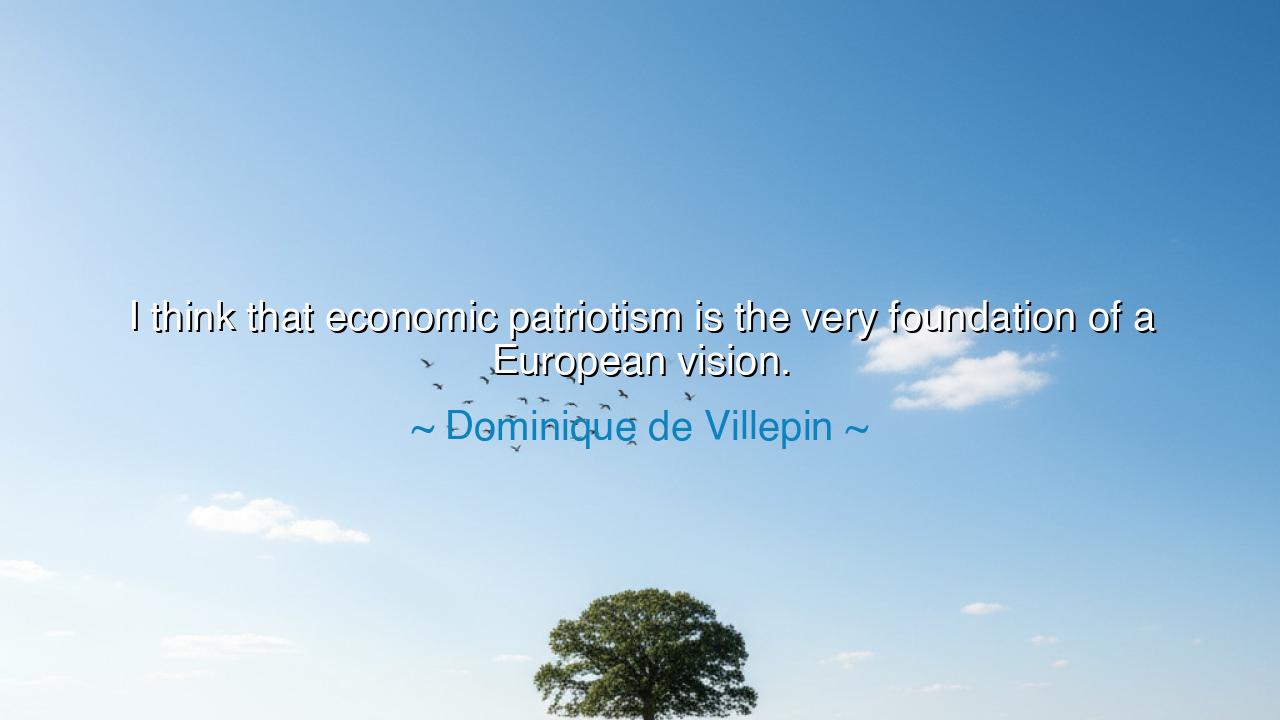
I think that economic patriotism is the very foundation of a






The statesman and diplomat Dominique de Villepin once declared: “I think that economic patriotism is the very foundation of a European vision.” In these words lies a profound meditation on the intertwined fates of commerce, culture, and loyalty. He speaks of economic patriotism not as mere protectionism or greed, but as a deliberate cultivation of national and continental strength, a recognition that the prosperity of a people rests upon their industries, trade, and the stewardship of their wealth. In Europe, a continent forged by centuries of conflict, cooperation, and cultural exchange, such patriotism becomes the bedrock of vision, unity, and sovereignty.
To understand de Villepin’s insight, one must look to the ancients, who taught that the prosperity of the polis depended on the diligence of its citizens, the wisdom of its rulers, and the protection of its resources. Economic vitality was seen as inseparable from civic virtue. In his statement, de Villepin echoes this wisdom: a nation cannot flourish without caring for the means that sustain it, nor can a continent endure without a shared vision of prosperity. Economic patriotism is thus both defense and devotion—it is the love of country expressed through the protection and growth of its wealth, its labor, and its ingenuity.
History offers a vivid example in the post-World War II reconstruction of Europe. Nations shattered by conflict came together to create the European Coal and Steel Community, a precursor to the European Union. By protecting strategic industries, promoting cooperative trade, and ensuring mutual prosperity, Europe forged a vision that transcended borders. Leaders understood that economic patriotism—investment in the people, industries, and infrastructure of the continent—was the foundation of peace, unity, and shared identity. Prosperity became the vessel through which ideals of solidarity and cooperation were expressed.
De Villepin’s words also remind us that patriotism need not always be symbolic. To love one’s country is to defend it with more than banners and speeches; it is to safeguard the livelihoods of its citizens, to nurture innovation, and to cultivate the industries that sustain future generations. The European vision he describes is one where nations act not in isolation, but in a web of interdependence, balancing self-interest with collective welfare. Here, economic patriotism is not selfish—it is enlightened, strategic, and moral, rooted in foresight and responsibility.
Consider the story of René Cassin, the French jurist and Nobel laureate, who helped rebuild European institutions after the ravages of war. He understood that legal frameworks and economic stability were inseparable: one could not flourish without the other. Economic patriotism, in this sense, became a moral imperative, ensuring that citizens had the means to live with dignity, that nations could preserve their cultures, and that Europe could chart a course of peace and stability in the aftermath of chaos.
The deeper lesson of de Villepin’s words is that love of country is multidimensional. Patriotism is not only expressed in arms, in sacrifice, or in the celebration of heritage—it is expressed in commerce, in industry, in the careful stewardship of resources. The European vision thrives when citizens and leaders understand that the wealth of the nation is the lifeblood of its liberty, its culture, and its capacity to act with independence on the global stage. Economic vigor is thus a moral and civic obligation.
Practically, this teaching calls each citizen and leader to act with foresight and responsibility. Support local industries, invest in innovation, honor the labor of your fellow citizens, and understand that economic choices have moral and patriotic weight. Engage in commerce and civic life with the awareness that the prosperity of the community is intertwined with the prosperity of the nation and continent. Protect what is precious, cultivate what is possible, and act with both vision and loyalty.
Thus, de Villepin’s insight endures: economic patriotism is not mere self-interest—it is the foundation upon which a civilization can build peace, culture, and enduring unity. In loving your nation, care for its industries, its laborers, and its resources. In this love, the European vision, and indeed any vision of a just and thriving society, finds its root. True patriotism, in every age, begins not only in the heart, but in the work, wealth, and stewardship of the people.






AAdministratorAdministrator
Welcome, honored guests. Please leave a comment, we will respond soon